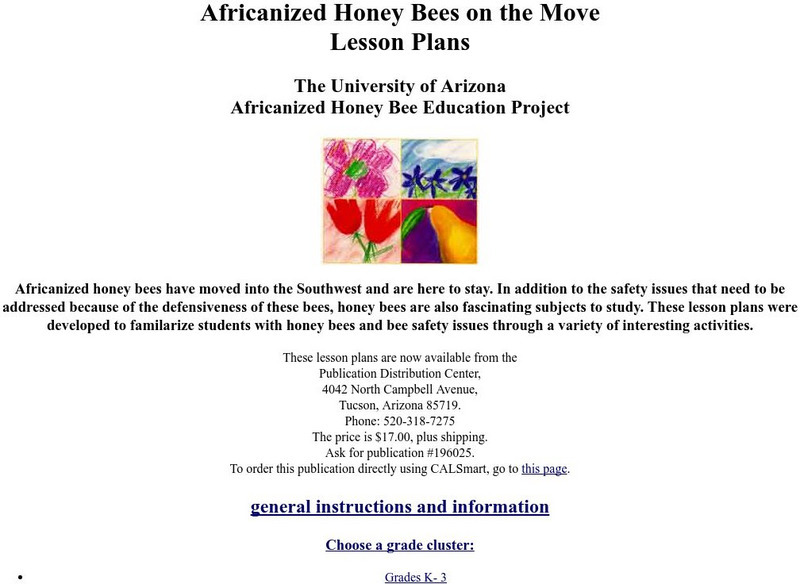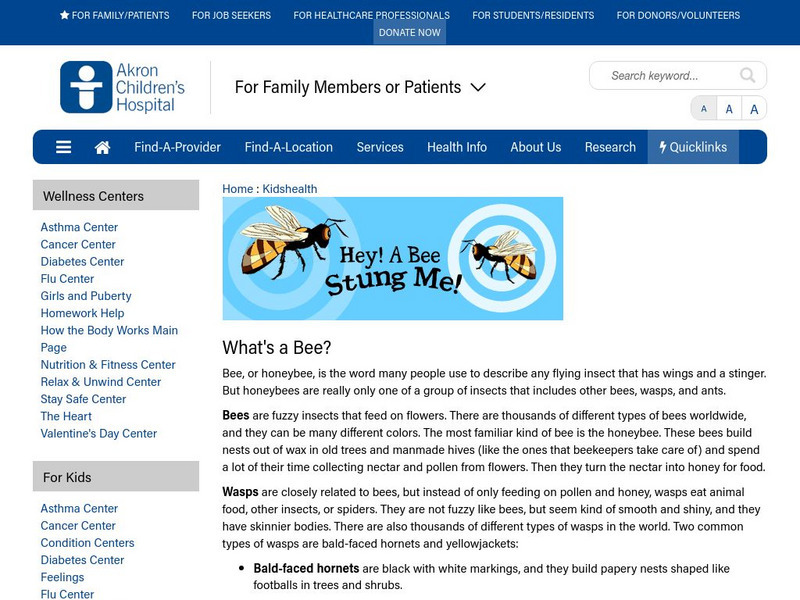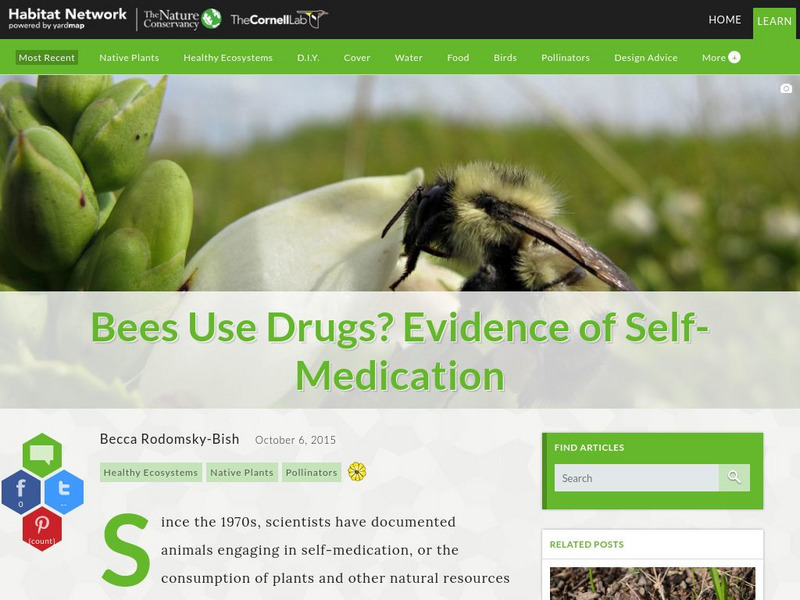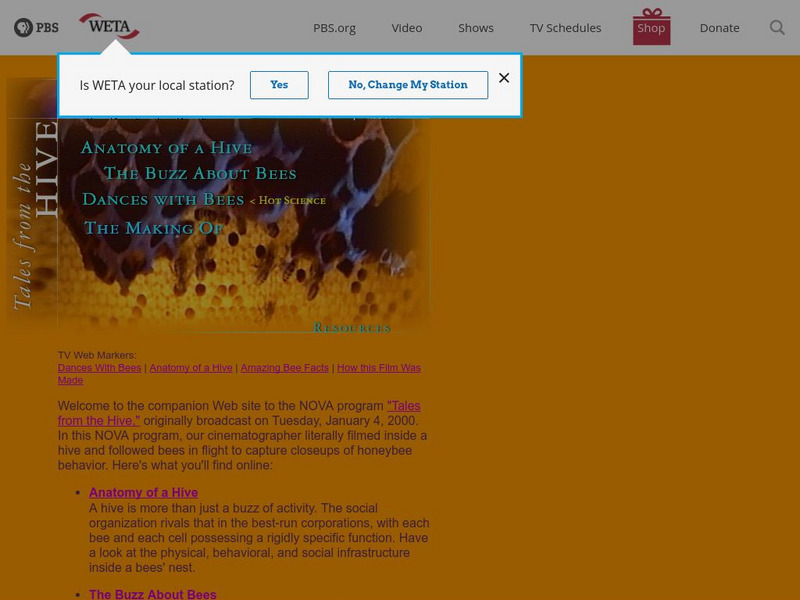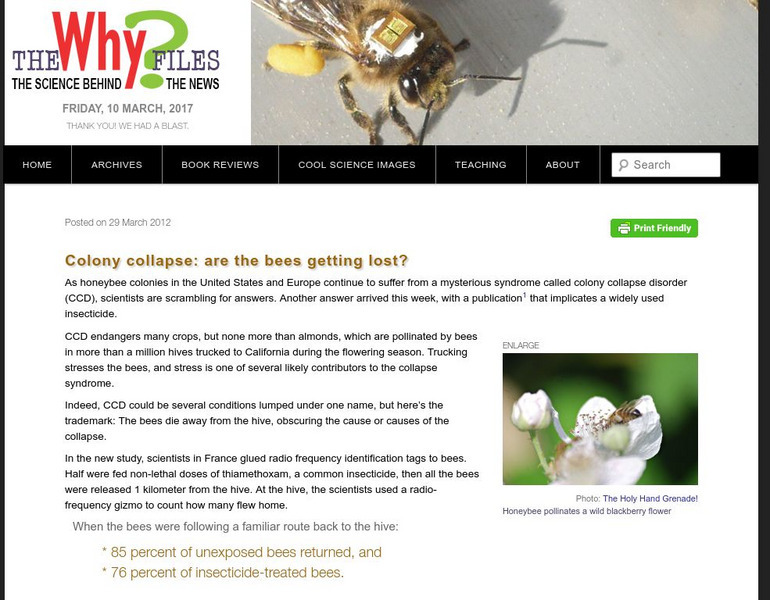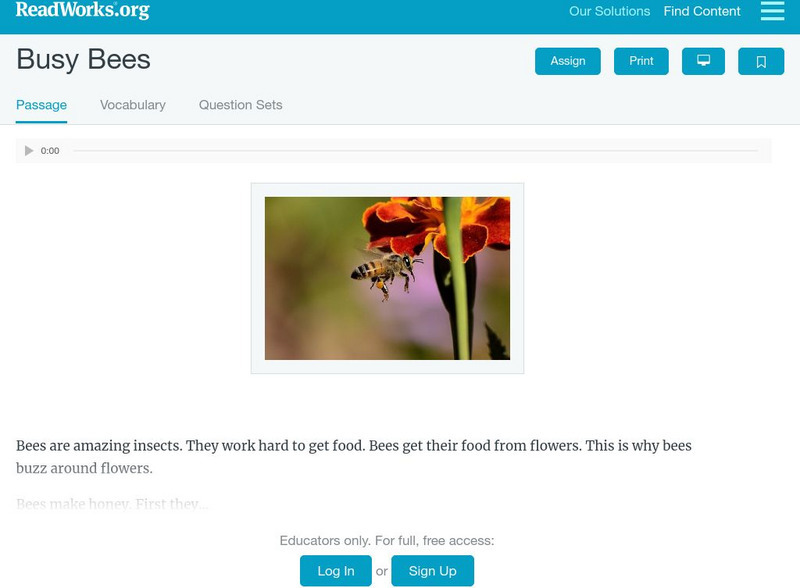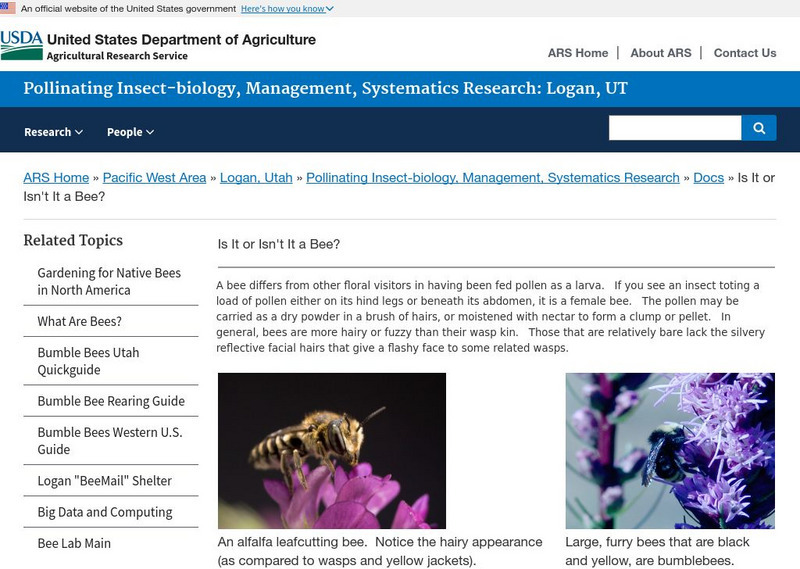Alabama Learning Exchange
Alex: Honey Bees
The students will do research to learn the various functions of bees within the hive and understand the process of making honey. Students will use numerous resources to find their information including the Internet, library books,...
Nature Conservancy
The Nature Conservancy: Discover the Culprit Behind Declining Bee Populations
Bees provide vital benefits to people, including crop pollination and products such as honey and beeswax. But we're losing bees through colony collapse disorder. In this lesson plan, students are put at the cutting edge of research on...
PBS
Idaho Ptv: Science Trek: Bees
A comprehensive overview of bees. Includes three videos: a half-hour show, a video short, and a short video where an expert answers children's questions. Other features of the site include facts, links, games and activities, a reading...
Scientific American
Scientific American: The Buzz on Bees: In Depth Reports
Read this multimedia article about the disappearance of bee colonies worldwide. Find out why it is crucial to saving this important pollinator from extinction.
Other
Penn State University: Bee Behavior
Penn State University and the Mid-Atlantic Apiculture Consortium offer an excellent site on everything you need to know about bee behavior.
Mocomi & Anibrain Digital Technologies
Mocomi: How Do Bees Make Honey?
Investigate how honey bees create the magical sweetener. Why are these bees so important to the environment?
University of Arizona
University of Arizona: Africanized Honey Bees on the Move
This is a lesson plan for grades 9 - 12. There are worksheets that can be printed out. Each activity and objective is stated.
Akron Children's Hospital
Akron Children's Hospital: Kidshealth: Hey! A Bee Stung Me!
Bee, or honeybee, is the word many people use to describe any flying insect that has wings and a stinger. Take a look at this article to learn more about bees.
Cornell Lab of Ornithology
Habitat Network: Bees Use Drugs? Evidence of Self Medication
There has been documented evidence that honey bees increase their foraging of antibiotic plant resins when under stress from fungal pathogens. Could more access to certain plants provide some solutions for decreasing bee populations?
PBS
Pbs Nova: Tales From the Hive
Website that accompanies the NOVA program "Tales from the Hive." Site includes additional facts on bees, specifically the breakdown of a bee hive, and the different dances bees do as well as what they mean.
PBS
Pbs: Nature: Alien Empire
Outstanding site that compliments an insect series on PBS. Interactive presentations include bee anatomy and honeybee hives. Includes interactive puzzles, teacher's guides, and formats for making insect masks.
University of Wisconsin
The Why Files: Honeybees Getting Lost?
As colony collapse disorder continues to attack honeybee hives, a new study shows that a common insecticide interferes with their return flights.
Read Works
Read Works: Worldwide Loss of Bees a Growing Concern
[Free Registration/Login Required] An informational text about the decreasing number of bees and the negative effects that can have on our food supply. A question sheet is available to help students build skills in reading comprehension.
Read Works
Read Works: The Buzz About Honey
[Free Registration/Login Required] This nonfiction passage discusses the role of honeybees in producing honey. This passage is intended for guided practice and is designed to reinforce essential reading comprehension skills.
Read Works
Read Works: Busy Bees
[Free Registration/Login Required] An informational text about how bees can be helpful and how they can be dangerous. A question sheet is available to help students build skills in reading comprehension.
San Diego Zoo Global
San Diego Zoo: Kids: Bee
Bees fly from flower to flower, sipping nectar and collecting grains of pollen. Bees have a special tongue that sucks up the nectar and a crop in their throat for storing it until they get back to the hive, where it is turned into honey...
Treehut
Suzy's World: Bees
Use this site to find out why bees make honey with this quick fact sheet on bees.
Canadian Museum of Nature
Canadian Museum of Nature: Bees
Bees are found all over the world and are vital for controlling other insect populations. Some basic facts about bees can be read here, and there are pictures as well.
US Department of Agriculture
Us Department of Agriculture: Is It or Isn't a Bee?
This informative site takes a look at other insects that look like bees but in fact are not. Physical traits and characteristics are commented on for comparison purposes.
The BIG zoo
The Big Zoo: Honey Bee
Site provides some fascinating facts regarding these extremely important insects. Contains a physical; description, information regarding their diet, habitat, social structure, birth and offspring as well as senses.
Other popular searches
- Africanized Honey Bees
- Math and Honey Bees
- Honeybee Life Cycle
- Science Honey Bees
- Americanized Honey Bees
- European Honey Bees
- Honey Bees Communication
- Honey Bees and Ants
- Honeybee Anatomy
- Honey Bees Pollination
- Over Wintering Honey Bees
- Pictures of a Honeybee








